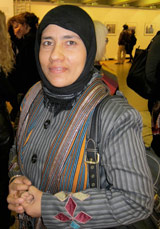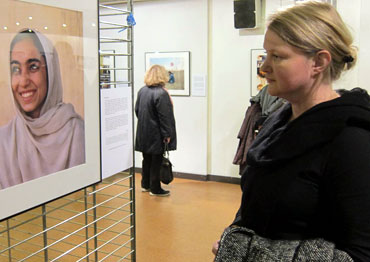In support of Afghan women’s voices, UNESCO hosted conference and photo exhibition
14-12-2010 (Paris)

Humaira Habib
© UNESCO
In commemoration of the International Day for the Elimination of Violence against Women (25 November), UNESCO welcomed at its Headquarters in Paris the photo exhibition “Voices on the Rise: Afghan Women Making the News”. The collection features portraits of women actively contributing to the reconstruction of a country struck by years of civil strife, through their engagement in media, civil society, politics, art and education, among other key areas of public life.
UNESCO launched the exhibition with a conference held on 22 November. The discussion was moderated by Mogens Schmidt, Director of UNESCO’s Division of Freedom of Expression, Democracy and Peace.
According to Jānis Kārkliņš, UNESCO’s Assistant Director General for Communication and Information, rather than depicting Afghan women mainly as a fragile population, the event sought to emphasize their central role in furthering Afghanistan’s development and to promote their fundamental freedoms. This notion is in line with UNESCO’s understanding of gender equality as a basic human right, a commonly-shared value and a necessary condition for the realization of the Millennium Development Goals.
Although the number of women working in the media has grown worldwide, noted Kārkliņš, they are still underrepresented in terms of decision-making, perceive lower salaries than men and are predominantly portrayed in stereotypical fashion in the news. UNESCO aims to tackle these issues through diverse interventions, including supporting the protection and training of Afghan women journalists, who face higher risks than their male colleagues, as well as discrimination, social and culturally-imposed limitations specifically related to gender.
Mohammad Kacem Fazelly, Permanent Delegate of Afghanistan to UNESCO, highlighted that women have led the fight for human rights in the country since the beginning of the 20th century, but their achievements suffered critical setbacks linked to the conflicts experienced by Afghan society. The country’s 1977 Constitution explicitly recognized gender equality, in a clause replicated in the 2004 Constitution thanks to the advocacy of women, who have been regaining some of their lost ground in the past years. Fazelly concluded that the case of Afghanistan illustrates that when women make their presence felt, they can make significant accomplishments even under difficult circumstances.
Accordingly, one of the exhibition’s co-curators, Khorshied Samad, stressed the relevance of telling positive stories about Afghanistan: since the end of the Taliban regime in 2001, women have increasingly returned to school and work, they run businesses and civil society organizations, and their access to credit and justice has expanded. Women are counted among parliament members, and the first political party devoted to their rights was created in 2009. Importantly, hundreds of women now work within the growing media sector.
However, there remain critical challenges, including the need to ensure long-standing peace, expand women’s economic opportunities and access to health, and counter the threats of domestic violence and child marriage, among others. Ms Samad concluded that the fight for women’s rights in Afghanistan, rather than a merely idealistic endeavor, can be seen as a cost-effective way to progress toward sustainable development, security and democratic stability. Therefore, the commitment with women’s rights needs to be renewed not because it is “a necessary thing to do”, but “the right thing to do”, she concluded.
Afghan researcher for Amnesty International, Horia Mosadiq, highlighted that the plight of women victims of violence is not unique to Afghanistan, but a pressing issue around the globe. She noted that, although there are Afghan women parliamentarians, they are still insufficiently protected. She called upon national authorities and the international community to strengthen their efforts toward translating the gender equality constitutional provision into reality and give it an important place within peace talks with the Taliban. She emphasized that Afghan women urgently needed a sense of certainty about the future, and the importance of listening to them in the context of policy design.
Humaira Habib heads a women’s community radio station in Afghanistan and was the main protagonist of the documentary “Girls on the Air” by Valentina Monti, which was screened as part of the event. Ms Habib identified security as the biggest obstacle faced by Afghan women. In the last 8 years, the dangers of working as a journalist have increased to the point that many women give up the possibility of being reporters, opting instead for safer jobs as announcers, for example. In many cases, this choice is not derived from their wish, but is related to family pressures and social restrictions.
In closing, Jane Mc Elhone, also co-curator of the photo exhibition, underlined that, regardless the ongoing challenges, the continued presence of Afghan women voices in the media in the past years has had a great impact. She pointed out that their chance of being heard is now considered as normal in Afghan society, as opposed to the situation in a relatively recent past and despite the fact that some would prefer them to remain silent.
According to Jānis Kārkliņš, UNESCO’s Assistant Director General for Communication and Information, rather than depicting Afghan women mainly as a fragile population, the event sought to emphasize their central role in furthering Afghanistan’s development and to promote their fundamental freedoms. This notion is in line with UNESCO’s understanding of gender equality as a basic human right, a commonly-shared value and a necessary condition for the realization of the Millennium Development Goals.
Although the number of women working in the media has grown worldwide, noted Kārkliņš, they are still underrepresented in terms of decision-making, perceive lower salaries than men and are predominantly portrayed in stereotypical fashion in the news. UNESCO aims to tackle these issues through diverse interventions, including supporting the protection and training of Afghan women journalists, who face higher risks than their male colleagues, as well as discrimination, social and culturally-imposed limitations specifically related to gender.
Mohammad Kacem Fazelly, Permanent Delegate of Afghanistan to UNESCO, highlighted that women have led the fight for human rights in the country since the beginning of the 20th century, but their achievements suffered critical setbacks linked to the conflicts experienced by Afghan society. The country’s 1977 Constitution explicitly recognized gender equality, in a clause replicated in the 2004 Constitution thanks to the advocacy of women, who have been regaining some of their lost ground in the past years. Fazelly concluded that the case of Afghanistan illustrates that when women make their presence felt, they can make significant accomplishments even under difficult circumstances.
Accordingly, one of the exhibition’s co-curators, Khorshied Samad, stressed the relevance of telling positive stories about Afghanistan: since the end of the Taliban regime in 2001, women have increasingly returned to school and work, they run businesses and civil society organizations, and their access to credit and justice has expanded. Women are counted among parliament members, and the first political party devoted to their rights was created in 2009. Importantly, hundreds of women now work within the growing media sector.
However, there remain critical challenges, including the need to ensure long-standing peace, expand women’s economic opportunities and access to health, and counter the threats of domestic violence and child marriage, among others. Ms Samad concluded that the fight for women’s rights in Afghanistan, rather than a merely idealistic endeavor, can be seen as a cost-effective way to progress toward sustainable development, security and democratic stability. Therefore, the commitment with women’s rights needs to be renewed not because it is “a necessary thing to do”, but “the right thing to do”, she concluded.
Afghan researcher for Amnesty International, Horia Mosadiq, highlighted that the plight of women victims of violence is not unique to Afghanistan, but a pressing issue around the globe. She noted that, although there are Afghan women parliamentarians, they are still insufficiently protected. She called upon national authorities and the international community to strengthen their efforts toward translating the gender equality constitutional provision into reality and give it an important place within peace talks with the Taliban. She emphasized that Afghan women urgently needed a sense of certainty about the future, and the importance of listening to them in the context of policy design.
Humaira Habib heads a women’s community radio station in Afghanistan and was the main protagonist of the documentary “Girls on the Air” by Valentina Monti, which was screened as part of the event. Ms Habib identified security as the biggest obstacle faced by Afghan women. In the last 8 years, the dangers of working as a journalist have increased to the point that many women give up the possibility of being reporters, opting instead for safer jobs as announcers, for example. In many cases, this choice is not derived from their wish, but is related to family pressures and social restrictions.
In closing, Jane Mc Elhone, also co-curator of the photo exhibition, underlined that, regardless the ongoing challenges, the continued presence of Afghan women voices in the media in the past years has had a great impact. She pointed out that their chance of being heard is now considered as normal in Afghan society, as opposed to the situation in a relatively recent past and despite the fact that some would prefer them to remain silent.
 Exhibition’s co-curators, Khorshied Samad (left) and Jane Mc Elhone
Exhibition’s co-curators, Khorshied Samad (left) and Jane Mc Elhone© UNESCO
 Exhibition visitor
Exhibition visitor© UNESCO
Related themes/countries
· Afghanistan
· Gender and ICT
Share this story:
Contact information
- UNESCO
Source














